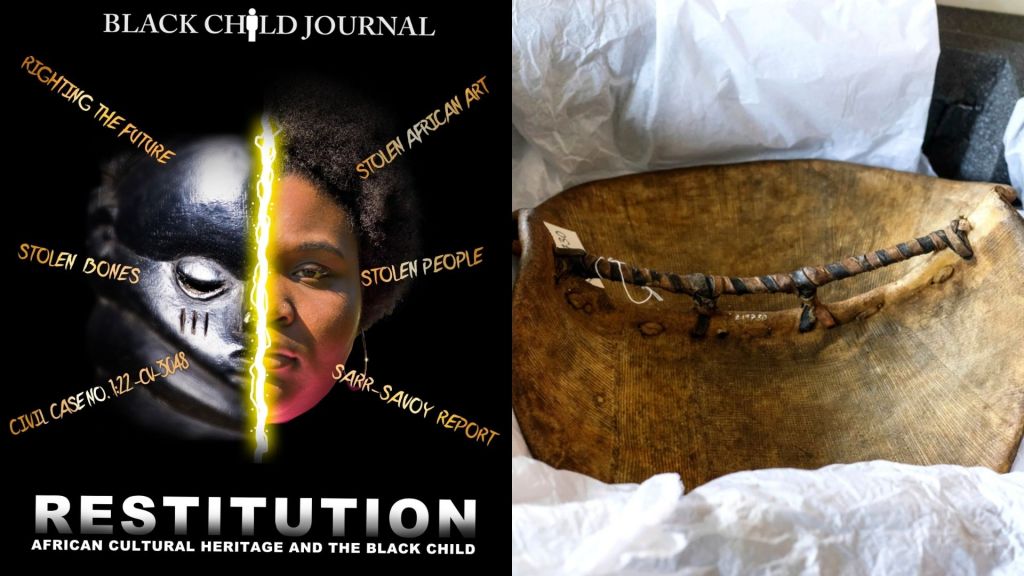By Sean Yoes
Special to the AFRO
Experts believe more than a million African artifacts are being held outside of the African continent, scattered mostly throughout Europe and North America in museums and private collections. Many were looted over centuries of colonization.

These stolen treasures represent a huge swath of Africa’s cultural heritage, and for decades, African nations have been demanding their return.
Recently, The Black Child Journal in collaboration with the Youth Resiliency Institute published, “Restitution: African Cultural Heritage and the Black Child.” This special edition of the publication sheds light on the topic of restitution of African cultural heritage and its profound impact on Black children.
“This special edition…is a virtual ‘how to,’ with respect to a history of restitution initiatives–practical, theoretical and policy-making approaches to such initiatives,” said Michael C. Edwards, editor of The Black Child Journal.
“The fruits of a long cultural and artistic heritage are vividly displayed in this edition of the Journal,” Edwards added.
The Black Child Journal, founded in 1979 by Useni Eugene Perkins in collaboration with the National Rites of Passage Institute, advocates on behalf of Black children and their families.
This special edition of the Journal, focused on the restitution of African cultural heritage, was guest edited by Fanon Hill, co-founder of the Youth Resiliency Institute (YRI).
“The special edition…provides a roadmap for Black children, young people and families living through intersecting forms of oppressions to connect with local, national and international emancipatory Black art networks,” said Hill, “while learning about the centrality of restitution of African cultural heritage as a critical intervention inextricably tied to the cultural, mental and spiritual well-being of Black children and youth.”
The YRI, which operates in the Cherry Hill community of South Baltimore and in East Cleveland, Ohio, focuses on underserved communities, utilizing a comprehensive approach that embraces African-centered rites of passage and cultural arts to fuel activism, community renewal, and grassroots public policy development.
“The future success of the movement for restitution of African cultural heritage hinges on our ability to cultivate the energy and potential of Black children and youth, not only in continental Africa, but wherever descendants of enslaved Africans live today,” Hill said.
Such a success in the ongoing struggle to restore African artifacts and cultural heritage took place in June, when 39 artifacts were formally returned to the nation of Uganda by the University of Cambridge. Technically, these artifacts will be returned via a three-year loan between museums of Britain and Uganda, and the agreement could lead to them remaining in Uganda permanently. According to Martin Mugarra, minister of tourism for Uganda, the process of returning the cultural objects to the East African nation began in 2016.
“Processes to repatriate the artifacts began in 2016, under the `Rethinking Uganda Museum’ project, which was conducted in collaboration with the University of Michigan,” said Mugarra in a social media post on X.
“These invaluable pieces were taken from Uganda during the 1890’s and early 1900’s by British colonial administrators, anthropologists, missionaries and soldiers,” Mugarra added. “This is not unique to Uganda. Many other African countries including Nigeria, Namibia, Ghana and Kenya are also getting these returns.”
The efforts of African nations to retrieve their invaluable stolen treasures underscores their vital contribution to the identity and cultural heritage of those nations, as well as the importance of educating young people about the value of these artifacts. To that end, the Youth Resiliency Institute engages children, youth and families in the restitution of African cultural heritage through the Mountain Movers Project. The Mountain Movers Project is a community arts initiative that functions as a hub and resource center that provides information, programming and facilitates intentional conversations on the relationship between restitution and the function of resistance, remembrance and cultural resilience in Black communities.
“Through cross-generational African-centered programming, the Mountain Movers Project introduces participants to vocabularies, tactics, strategies, and frameworks prerequisite for analysis of the legacy of colonial violence in setting perimeters for the ways that racism and imbalances of power are perpetuated by museums and cultural institutions today,” said Hill.
In 2023 and earlier in 2024, Mountain Movers Project youth participants traveled to West Africa to learn about how African artists are rejecting the western model of museums.
Three Mountain Movers youth participants from Cherry Hill were acknowledged by Dr. Atiba Coppock, co-editor of the Black Child Journal, for their contributions to the special restitution of the African heritage edition of the publication. The public affirmation of those three young people by Dr. Coppock came during an ideal time for the Cherry Hill residents, during the eighth annual Cherry Hill Arts & Music Waterfront Festival in July.
“It is crucial that Black children and youths are not merely participants, but rather leaders and innovators in this transformative journey,” Hill said.
“Restitution–African Cultural Heritage and the Black Child,” is available at: blackchildjournal.com.
The post Advocates: Restoring African cultural heritage crucial for Black children appeared first on AFRO American Newspapers.











